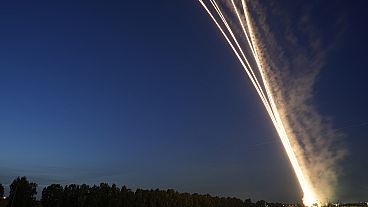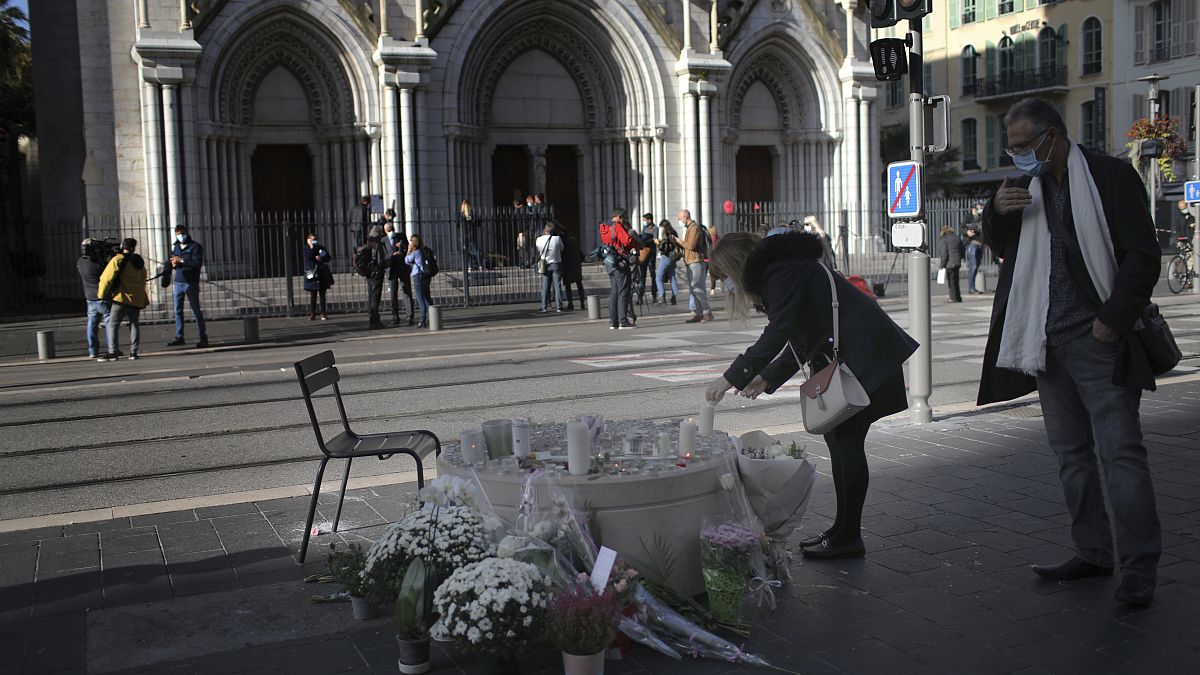Three people were killed in the second suspected Islamist extremist attack on French soil in less than two weeks. Here's what we know about the stabbings.
A deadly knife attack, which took place at a church in France's southern city of Nice on Thursday, jolted the country just hours before it was put under a second coronavirus lockdown.
Three people were killed in the second suspected Islamist extremist attack on French soil in less than two weeks.
Here's what we know about the attack so far.
What happened at the church?
Speaking at a press conference, France's anti-terrorism prosecutor Jean-Francois Ricard said a man and woman were killed by the knifeman inside Nice's basilica.
A 60-year-old woman suffered "a very deep throat-slitting, like a decapitation," he said.
A 55-year-old man died after deep cuts to his throat, the prosecutor added.
The third victim, a 44-year-old woman, managed to flee the church but died at a nearby restaurant.
The victims were "targeted for the sole reason that they were present in the church at the time," Ricard said.
The suspect approached police when they arrived at the scene in a "threatening manner" repeated "Allahu Akbar" (God is greatest in Arabic), according to the prosecutor.
The attacker was seriously wounded by police and hospitalised in a life-threatening condition, authorities said.
They called the attack “Islamist terrorism” and prosecutors in France and Tunisia are investigating.
What do we know about the attack suspect?
The suspect is a Tunisian, born in 1999, who arrived in Italy by reaching the Mediterranean island of Lampedusa on September 20 and travelled to Paris on October 9.
Ricard said the attacker was carrying a copy of the Quran, the Islamic holy book.
A knife with a 17-centimetre blade that was used in the attack was found near him along with a bag containing another two knives that were not used in the Nice stabbing.
What do we know about the victims?
One of the victims was 55-year-old Vincent Loques, a father of two who was the church's sacristan (in charge of its holy objects), according to local broadcaster France-Bleu.
One person who came to pray for Loquès at the Nice basilica told France Info: "He fed the refugees, he had a good heart."
Another was a 44-year-old mother of three from Brazil, according to Brazil's Foreign Ministry. France-Bleu said the woman's name was Simone and that she had studied cooking in Nice and helped poor communities in the area.
What's the backdrop to the attack in France?
A climate of religious and geopolitical tension has been mounting around cartoons published in France mocking the prophet of Islam.
The attack was the third in less than two months that French authorities have attributed to Muslim extremists, including the beheading of a teacher who had shown caricatures of the Prophet Muhammad in class after the images were re-published by satirical newspaper Charlie Hebdo.
The images deeply offended many Muslims, and protesters burned French flags, stomped on portraits of French President Emmanuel Macron and called for boycotts of French products at demonstrations in Pakistan, India and Afghanistan.
The origins of the outrage in parts of the Muslim world over the French president's stance towards Islam spring from a speech he gave earlier this month, before the beheading of teacher Samuel Paty.
Turkish President Recep Tayyip Erdoğan questioned Macron's mental condition while criticising the French President's attitude toward Islam and Muslims, a move which prompted France to recall its ambassador to Turkey.
But after Paty's brutal killing, Macron defended freedom of expression: "We will not give up caricatures and drawings, even if others back away", calling for an end to hatred and violence and for respect for others.
Around the Mideast and Asia, Muslims offended by the caricatures of the Prophet Muhammad and Macron's firm stance held more protests Friday.
France heightened security nationwide, including raising its terror alert to its highest level after the Nice attack. Macron said he would increase the number of soldiers deployed to protect French schools and religious sites from around 3,000 to 7,000.
Many French Muslims and groups representing them have denounced the killings and warned against stigmatising the country's peaceful Muslim majority.
Nice imam Otmane Aissaoui denounced the "terrible act of terror, of savagery, of human insanity that plunges us into sadness, shock and pain", which he said once again puts French Muslims in the spotlight.


